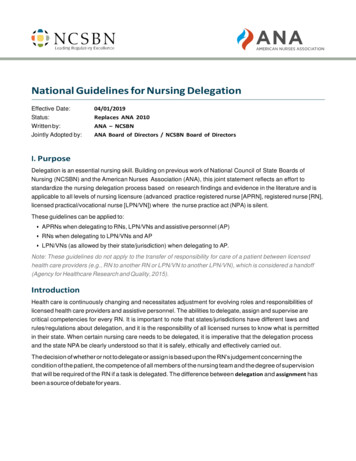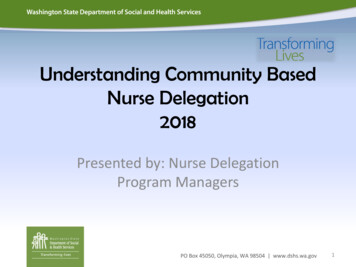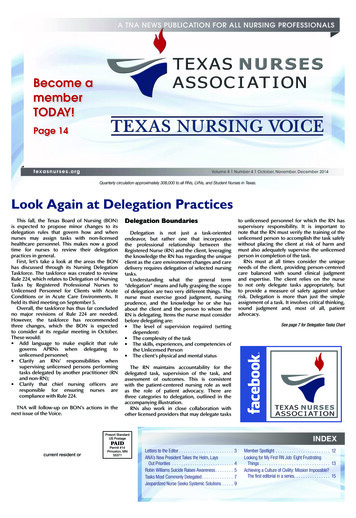
Transcription
National Guidelines for Nursing DelegationEffective Date:04/01/2019Status:Replaces ANA 2010Written by:ANA – NCSBNJointly Adopted by:ANA Board of Directors / NCSBN Board of DirectorsI. PurposeDelegation is an essential nursing skill. Building on previous work of National Council of State Boards ofNursing (NCSBN) and the American Nurses Association (ANA), this joint statement reflects an effort tostandardize the nursing delegation process based on research findings and evidence in the literature and isapplicable to all levels of nursing licensure (advanced practice registered nurse [APRN], registered nurse [RN],licensed practical/vocational nurse [LPN/VN]) where the nurse practice act (NPA) is silent.These guidelines can be applied to: APRNs when delegating to RNs, LPN/VNs and assistive personnel (AP) RNs when delegating to LPN/VNs and AP LPN/VNs (as allowed by their state/jurisdiction) when delegating to AP.Note: These guidelines do not apply to the transfer of responsibility for care of a patient between licensedhealth care providers (e.g., RN to another RN or LPN/VN to another LPN/VN), which is considered a handoff(Agency for Healthcare Research and Quality, 2015).IntroductionHealth care is continuously changing and necessitates adjustment for evolving roles and responsibilities oflicensed health care providers and assistive personnel. The abilities to delegate, assign and supervise arecritical competencies for every RN. It is important to note that states/jurisdictions have different laws andrules/regulations about delegation, and it is the responsibility of all licensed nurses to know what is permittedin their state. When certain nursing care needs to be delegated, it is imperative that the delegation processand the state NPA be clearly understood so that it is safely, ethically and effectively carried out.The decision of whether or not to delegate or assign is based upon the RN’s judgement concerning thecondition of the patient, the competence of all members of the nursing team and the degree of supervisionthat will be required of the RN if a task is delegated. The difference between delegation and assignment hasbeen a source of debate for years.
DefinitionsAccountability: “To be answerable to oneself and others for one’s own choices, decisions and actions asmeasured against a standard ” (American Nurses Association, 2015, p. 41).Delegated Responsibility: A nursing activity, skill or procedure that is transferred from a licensed nurse toa delegatee.Delegatee: One who is delegated a nursing responsibility by either an APRN, RN or LPN/VN (where statesNPA allows), is competent to perform it and verbally accepts the responsibility. A delegatee may be an RN,LPN/VN or AP.Delegator: One who delegates a nursing responsibility. A delegator may be APRN, RN, or LPN/VN (wherestate NPA allows).Assignment: The routine care, activities and procedures that are within the authorized scope of practiceof the RN or LPN/VN or part of the routine functions of the AP.Licensed Nurse: A licensed nurse includes APRNs, RNs and LPN/VNs. In some states/jurisdictions, LPN/VNs may be allowed to delegate.Assistive Personnel (AP): Any assistive personnel trained to function in a supportive role, regardlessof title, to whom a nursing responsibility may be delegated. This includes but is not limited to certifiednursing assistants or aides (CNAs), patient care technicians, CMAs, certified medication aids, and homehealth aides (formerly referred to as ‘‘unlicensed” assistive personnel [UAP]).When performing a fundamental skill on the job, the delegatee is considered to be carrying out an assignment.The routine care, activities and procedures assigned are those which would have been included in thedelegatee’s basic educational program. A licensed nurse is still responsible for ensuring an assignment iscarried out completely and correctly. Delegation is allowing a delegatee to perform a specific nursing activity,skill, or procedure that is beyond the delegatee’s traditional role and not routinely performed. This applies tolicensed nurses as well as AP. Regardless of the current role of the delegatee (RN, LPN/ VN or AP), delegationcan be summarized as follows: A delegatee is allowed to perform a specific nursing activity, skill or procedure that is outside thetraditional role and basic responsibilities of the delegatee’s current job. The delegatee has obtained the additional education and training, and validated competence to performthe care/delegated responsibility. The context and processes associated with competency validationwill be different for each activity, skill or procedure being delegated. Competency validation should bespecific to the knowledge and skill needed to safely perform the delegated responsibility as well as tothe level of practitioner (i.e., RN, LPN/VN, AP) to whom the activity, skill or procedure has been delegated.The licensed nurse who delegates the “responsibility” maintains overall accountability for the patient.However, the delegatee bears the responsibility for the delegated activity, skill or procedure.Page 2 of 10
The licensed nurse cannot delegate nursing judgment or any activity that will involve nursing judgment orcritical decision making. Nursing responsibilities are delegated by someone who has the authority to delegate. The delegated responsibility is within the delegator’s scope of practice. When delegating to a licensed nurse, the delegated responsibility must be within the parameters of thedelegatee’s authorized scope of practice under the NPA. Regardless of how the state/jurisdiction definesdelegation, as compared to assignment, appropriate delegation allows for transition of a responsibility in asafe and consistent manner. Clinical reasoning, nursing judgement and critical decision making cannot bedelegated.The delegation process is multifaceted. It begins with the administrative level of the organization including:determining nursing responsibilities that can be delegated, to whom, and what circumstances; developingdelegation policies and procedures; periodically evaluating delegation processes; promoting positive culture/work environment. Then the licensed nurse must be responsible for determining patient needs and whento delegate, ensure availability to delegate, evaluate outcomes of and maintain accountability for delegatedresponsibility. Finally, the delegatee must accept activities based on their competency level, maintaincompetence for delegated responsibility and maintain accountability for delegated activity.Page 3 of 10
Five Rights of DelegationRight task: The activity falls within the delegatee’s job description or is included as part of the establishedwritten policies and procedures of the nursing practice setting. The facility needs to ensure thepolicies and procedures describe the expectations and limits of the activity and provide any necessarycompetency training.Right circumstance: The health condition of the patient must be stable. If the patient’s condition changes,the delegatee must communicate this to the licensed nurse, and the licensed nurse must reassess thesituation and the appropriateness of the delegation.Right person: The licensed nurse along with the employer and the delegatee is responsible for ensuringthat the delegatee possesses the appropriate skills and knowledge to perform the activity.Right directions and communication: Each delegation situation should be specific to the patient, thelicensed nurse and the delegatee. The licensed nurse is expected to communicate specific instructionsfor the delegated activity to the delegatee; the delegatee, as part of two-way communication, should askany clarifying questions. This communication includes any data that need to be collected, the methodfor collecting the data, the time frame for reporting the results to the licensed nurse, and additionalinformation pertinent to the situation. The delegatee must understand the terms of the delegationand must agree to accept the delegated activity. The licensed nurse should ensure that the delegateeunderstands that she or he cannot make any decisions or modifications in carrying out the activity withoutfirst consulting the licensed nurse.Right supervision and evaluation: The licensed nurse is responsible for monitoring the delegated activity,following up with the delegatee at the completion of the activity, and evaluating patient outcomes.The delegatee is responsible for communicating patient information to the licensed nurse during thedelegation situation. The licensed nurse should be ready and available to intervene as necessary. Thelicensed nurse should ensure appropriate documentation of the activity is completed.Source: NCSBN. (1995, 1996)Page 4 of 10
Guidelines for DelegationEmployer/Nurse Leader Responsibilities1. The employer must identify a nurse leader responsible for oversight of delegated responsibilitiesfor the facility. If there is only one licensed nurse within the practice setting, that licensed nurse must beresponsible for oversight of delegated responsibilities for the facility.Rationale: The nurse leader has the ability to assess the needs of the facility, understand the typeof knowledge and skill needed to perform a specific nursing responsibility, and be accountable formaintaining a safe environment for patients. He or she is also aware of the knowledge, skill leveland limitations of the licensed nurses and AP. Additionally, the nurse leader is positioned to developappropriate staffing models that take into consideration the need for delegation. Therefore, the decisionto delegate begins with a thorough assessment by a nurse leader designated by the institution to overseethe process.2. The designated nurse leader responsible for delegation, ideally with a committee (consisting ofother nurse leaders) formed for the purposes of addressing delegation, must determine which nursingresponsibilities may be delegated, to whom and under what circumstances. The nurse leader must beaware of the state/jurisdiction’s NPA and the laws/rules and regulations that affect the delegation processand ensure all institution policies are in accordance with the law.Rationale: A systematic approach to the delegation process fosters communication and consistency ofthe process throughout the facility.3. Policies and procedures for delegation must be developed. The employer/nurse leader must outlinespecific responsibilities that can be delegated and to whom these responsibilities can be delegated. Thepolicies and procedures should also indicate what may not be delegated. The employer must periodicallyreview the policies and procedures for delegation to ensure they remain consistent with current nursingpractice trends and that they are consistent with the state/jurisdiction’s NPA (institution/employer policiescan be more restrictive, but not less restrictive).Rationale: Policies and procedures standardize the appropriate method of care and ensure safe practices.Having a policy and procedure specific to delegation and delegated responsibilities eliminates questionsfrom licensed nurses and AP about what can be delegated and how they should be performed.4. The employer/nurse leader must communicate information about delegation to the licensed nursesand AP and educate them about what responsibilities can be delegated. This information shouldinclude the competencies of delegatees who can safely perform a specific nursing responsibility.Rationale: Licensed nurses must be aware of the competence level of staff and expectations fordelegation (as described within the policies and procedures) in order to make informed decisions onwhether or not delegation is appropriate for the given situation. Licensed nurses maintain accountabilityfor the patient. However, the delegatee has responsibility for the delegated activity, skill or procedure.Page 5 of 10
Employer/Nurse Leader Responsibilities (continued)5. All delegatees must demonstrate knowledge and competency on how to perform a delegatedresponsibility. Therefore, the employer/nurse leader is responsible for providing access to training andeducation specific to the delegated responsibilities. This applies to all RNs, LPN/VNs and AP who willbe delegatees. Competency validation should follow education and competency testing should be kepton file. Competency must be periodically evaluated to ensure continued competency. The context andprocesses associated with competency validation will be different for each activity, skill or procedurebeing delegated. Competency validation should be specific to the knowledge and skill needed to safelyperform the delegated responsibility as well as to the level of practitioner (i.e., RN, LPN/VN, AP) to whomthe activity, skill, or procedure has been delegated.Rationale: This ensures that competency of the delegatee is determined not only at the beginning of thedelegation process, but on an ongoing basis, as well.6. The nurse leader responsible for delegation, along with other nurse leaders and administratorswithin the facility, must periodically evaluate the delegation process. The licensed nurse and/or his orher manager (if applicable) must report any incidences to the nurse leader responsible for delegation. Adecision should be made about corrective action, including if further education and training are needed,or if that individual should not be allowed to perform a specific delegated responsibility.Rationale: Patient safety should always be the priority for a health care setting. If any compromises in careare noted, immediate action must be taken. Gravlin and Bittner (2010) identified that evaluation of theeffectiveness of the delegation process and resolution of any issues is critical to delegation.7. The employer/nurse leader must promote a positive culture and work environment for delegation.Rationale: A positive culture nurtures effective communication and collaboration in order to create anenvironment supportive of patient directed care.Page 6 of 10
Licensed Nurse ResponsibilitiesAny decision to delegate a nursing responsibility must be based on the needs of the patient or population,the stability and predictability of the patient’s condition, the documented training and competence ofthe delegatee, and the ability of the licensed nurse to supervise the delegated responsibility and itsoutcome, with special consideration to the available staff mix and patient acuity. Additionally, the licensednurse must consider the state/jurisdiction’s provisions for delegation and the employer’s policies andprocedures prior to making a final decision to delegate. Licensed nurses must be aware that delegationis at the nurse’s discretion, with consideration of the particular situation. The licensed nurse maintainsaccountability for the patient, while the delegatee is responsible for the delegated activity, skill orprocedure. If, under the circumstances, a nurse does not feel it is appropriate to delegate a certainresponsibility to a delegatee, the delegating nurse should perform the activity him/herself.1. The licensed nurse must determine when and what to delegate based on the practice setting, thepatients’ needs and condition, the state/jurisdiction’s provisions for delegation, and the employerpolicies and procedures regarding delegating a specific responsibility. The licensed nurse mustdetermine the needs of the patient and whether those needs are matched by the knowledge, skills andabilities of the delegatee and can be performed safely by the delegatee. The licensed nurse cannotdelegate any activity that requires clinical reasoning, nursing judgment or critical decision making. Thelicensed nurse must ultimately make the final decision whether an activity is appropriate to delegate tothe delegatee based on the Five Rights of Delegation (NCSBN, 1995, 1996).Rationale: The licensed nurse, who is present at the point of care, is in the best position to assess theneeds of the patient and what can or cannot be delegated in specific situations.2. The licensed nurse must communicate with the delegatee who will be assisting in providing patientcare. This should include reviewing the delegatee’s assignment and discussing delegated responsibilities,including information on the patient’s condition/stability, any specific information pertaining to a certainpatient (e.g., no blood draws in the right arm), and any specific information about the patient’s conditionthat should be communicated back to the licensed nurse by the delegatee.Rationale: Communication must be a two-way process involving both the licensed nurse delegatingthe activity and the delegatee being delegated the responsibility. Evidence shows that the betterthe communication between the nurse and the delegatee, the more optimal the outcome (Corazzini,Anderson, Mueller, Hunt-McKinney et al., 2013). The licensed nurse must provide information about thepatient and care requirements. This includes any specific issues related to any delegated responsibilities.These instructions should include any unique patient requirements. The licensed nurse must instruct thedelegatee to regularly communicate the status of the patient.Page 7 of 10
Licensed Nurse Responsibilities (continued)3. The licensed nurse must be available to the delegatee for guidance and questions, includingassisting with the delegated responsibility, if necessary, or performing it him/herself if the patient’scondition or other circumstances warrant doing so.Rationale: Delegation calls for nursing judgment throughout the process. The final decision to delegaterests in the hands of the licensed nurse as he or she has overall accountability for the patient.4. The licensed nurse must follow up with the delegatee and the patient after the delegatedresponsibility has been completed.Rationale: The licensed nurse who delegates the “responsibility” maintains overall accountability forthe patient, while the delegatee is responsible for the delegated activity, skill or procedure.5. The licensed nurse must provide feedback information about the delegation process and anyissues regarding delegatee competence level to the nurse leader. Licensed nurses in the facilityneed to communicate, to the nurse leader responsible for delegation, any issues arising related todelegation and any individual that they identify as not being competent in a specific responsibilityor unable to use good judgment and decision making.Rationale: This will allow the nurse leader responsible for delegation to develop a plan to addressthe situation.Delegatee ResponsibilitiesEveryone is responsible for the well-being of patients. While the nurse is ultimately accountable forthe overall care provided to a patient, the delegatee shares the responsibility for the patient and isfully responsible for the delegated activity, skill or procedure.1. The delegatee must accept only the delegated responsibilities that he or she is appropriatelytrained and educated to perform and feels comfortable doing given the specific circumstancesin the health care setting and patient’s condition. The delegatee should confirm acceptance ofthe responsibility to carry out the delegated activity. If the delegatee does not believe he or she hasthe appropriate competency to complete the delegated responsibility, then the delegatee shouldnot accept the delegated responsibility. This includes informing the nursing leadership if he or shedoes not feel he or she has received adequate training to perform the delegated responsibility, is notperforming the procedure frequently enough to do it safely, or his or her knowledge and skills needupdating.Rationale: The delegatee shares the responsibility to keep patients safe and this includes onlyperforming activities, skills or procedures in which he or she is competent and comfortable doing.Page 8 of 10
Delegatee Responsibilities (continued)2. The delegatee must maintain competency for the delegated responsibility.Rationale: Competency is an ongoing process. Even if properly taught, the delegatee may become lesscompetent if he or she does not frequently perform the procedure. Given that the delegatee sharesthe responsibility for the patient, the delegatee also has a responsibility to maintain competency.3. The delegatee must communicate with the licensed nurse in charge of the patient. This includesany questions related to the delegated responsibility and follow-up on any unusual incidents that mayhave occurred while the delegatee was performing the delegated responsibility, any concerns about apatient’s condition, and any other information important to the patient’s care.Rationale: The delegatee is a partner in providing patient care. He or she is interacting with thepatient/family and caring for the patient. This information and two-way communication is importantfor successful delegation and optimal outcomes for the patient.4. Once the delegatee verifies acceptance of the delegated responsibility, the delegatee isaccountable for carrying out the delegated responsibility correctly and completing timely andaccurate documentation per facility policy. The delegatee cannot delegate to another individual. Ifthe delegatee is unable to complete the responsibility or feels as though he or she needs assistance,the delegatee should inform the licensed nurse immediately so the licensed nurse can assess thesituation and provide support. Only the licensed nurse can determine if it is appropriate to delegatethe activity to another individual. If at any time the licensed nurse determines he or she needs toperform the delegated responsibility, the delegatee must relinquish responsibility upon request of thelicensed nurse.Rationale: Only a licensed nurse can delegate. In addition, because they are responsible, they needto provide direction, determine who is going to carry out the delegated responsibility, and assistor perform the responsibility him/herself, if he or she deems that appropriate under the givencircumstances.ReferencesAgency for Healthcare Research and Quality. (2015). Patient safety primers: Handoffs and signouts. Retrievedfrom www.psnet.ahrq.gov/primer.aspx?primerID 9American Diabetes Association. (2008). Diabetes care tasks at school: What key personnel need to know.Retrieved from diabetes-care-tasks.htmlAmerican Nurses Association. Code of ethics for nurses with interpretive statements. Silver Spring, MD:Nursebooks.org, 2015.Anthony, M. K., & Vidal, K. (2010). Mindful communication: A novel approach to improving delegation andincreasing patient safety. The Online Journal of Issues in Nursing, 15(2).Bittner, N. P., & Gravlin, G. (2009). Critical thinking, delegation, and missed care in nursing practice. JONA, 39(3),142–146.Page 9 of 10
Budden, J. (2011). The first national survey of medication aides. Journal of Nursing Regulation, 2(3), 4–12.Corazzini, K. N., Anderson, R. A., Rapp, C. G., Mueller, C., McConnell, E. S., & Lekan, D. (2010). Delegationin long-term care: Scope of practice or job description? The Online Journal of Issues in Nursing, 15(2).doi:10.3912/OJIN.Vol15No02Man04Corazzini, K. N., Anderson, R. A., Mueller, C., Hunt-McKinney, S., Day, L., & Porter, K. (2013). Understanding RN andLPN patterns of practice in nursing homes. Journal of Nursing Regulation, 4(1), 14–18.Corazzini, K. N., Anderson, R. A., Mueller, C., McConnell, E. S., Landerman, L. R., Thorpe, J. M., & Short, N. M. (2011).Regulation of LPN scope of practice in long-term care. Journal of Nursing Regulation, 2(2), 30–36.Corazzini, K. N., Anderson, R. A., Mueller, C., Thorpe, J. M., & McConnell, E. S. (2013). Licensed practical nursescope of practice and quality of nursing home care. Nursing Research, 62(5), 315–324.Damgaard, G., & Young, L. (2014). Virtual nursing care for school children with diabetes. Journal of NursingRegulation, 4(4), 15–24.Gravlin, G., & Bittner, N. P. (2010). Nurses’ and nursing assistants’ reports of missed care and delegation. JONA,40(7/8), 329–335.Jenkins, B., & Joyner, J. (2013). Preparation, roles, and perceived effectiveness of unlicensed assistive personnel.Journal of Nursing Regulation, 4(3), 33–39.Kalisch, B. J. (2011). The impact of RN-UAP relationships on quality and safety. Nursing Management, 42(9), 16–22.McMullen, T. L., Resnick, B., Chin-Hansen, J., Geiger-Brown, J. M., Miller, N., & Rubenstein, R. (2015). Certifiednurse aide scope of practice: State-by-state differences in allowable delegated activities. Journal of theAmerican Medical Directors Association, 16(1), 20–24.Mitty, E., Resnick, B., Allen, J., Bakerjian, D., Hertz, J., Gardner, W., Mezey, M. (2010). Nursing delegation andmedication administration in assisted living. Nursing Administration Quarterly, 34(2), 162– 171.Mueller, C., Anderson, R. A., McConnell, E. S., & Corazzini, K. (2012). Licensed nurse responsibilities in nursinghomes: A scope-of-practice issue. Journal of Nursing Regulation, 3(1), 13–20.Mueller, C., & Vogelsmeier, A. (2013). Effective delegation: Understanding responsibility, authority, andaccountability. Journal of Nursing Regulation, 4(3), 20–27NCSBN. (1996). Delegation: Concepts and decision-making process. National Council of State Boards of Nursing1996 Annual Meeting Business Book.NCSBN. (1995). Delegation decision-making process. National Council of State Boards of Nursing 1995 AnnualMeeting Business Book.NCSBN. (2016) National Guidelines for Nursing Delegation – Continuing EducationJournal of NursingRegulation (April 2016 7(1) https://www.ncsbn.org/NCSBN Delegation Guidelines.pdfSaccomano, S. J., & Pinto-Zipp, G. (2011). Registered nurse leadership style and confidence in delegation. Journalof Nursing Management, 19, 522–533. Young, L., & Damgaard, G. (2015). Transitioning the virtual nursingcare for school children with diabetes study to a sustainable model of nursing care. Journal of NursingRegulation, 6(2), 4–9.Page 10 of 10
The delegatee is responsible for communicating patient information to the licensed nurse during the delegation situation. The licensed nurse should be ready and available to intervene as necessary. The licensed nurse should ensure appropriate documentation of the activity is completed. Source: NCSBN. (1995, 1996)











